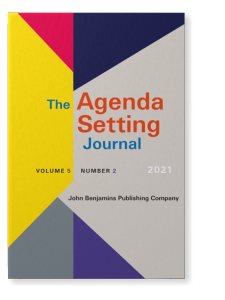The Agenda Setting Journal | Theory, Practice, Critique
While the essence of the definition remains the same, the idea has exploded into an internationally-recognized, maturing and expanding theory. A research tradition focused on the interface of the mass media agenda and the public agenda has been used by scholars/academics, industry professionals and think tanks globally to explain political, economic, historical, social, sociological, psychological, sports-centric, health-related, medicinal, business-oriented, technological and more concepts.
The Agenda Setting Journal: Theory, Practice, Critique focuses on the theoretical developments that continue in agenda setting and how the theory is applied to areas outside of mass communication. The journal also represents the growth and maturity of the communication field as it is also the first and only to-date theory-based journal in the communication discipline.
Issues
Online-first articlesVolume 5 (2021)
Volume 4 (2020)
Volume 3 (2019)
Volume 2 (2018)
Volume 1 (2017)
Board
Subscription Info
General information about our electronic journals.
Subscription rates
All prices for print + online include postage/handling.
| Online-only | Print + online |
|---|
Available back-volumes
| Online-only | Print + online | ||
|---|---|---|---|
| Complete backset (Vols. 1‒5; 2017‒2021) |
10 issues; 1,000 pp. |
EUR 767.00 | EUR 841.00 |
| Volumes 4‒5 (2020‒2021) | 2 issues; avg. 200 pp. | EUR |
EUR |
| Volume 3 (2019) | 2 issues; 200 pp. | EUR |
EUR |
| Volume 2 (2018) | 2 issues; 200 pp. | EUR |
EUR |
| Volume 1 (2017) | 2 issues; 200 pp. | EUR |
EUR |

 colorado.edu
colorado.edu